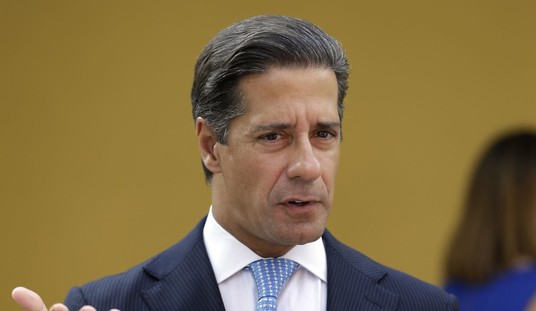To paraphrase the Rolling Stones: You can’t always not get what you were forced to “want,” but if you try sometimes, you get what you need. Boris Johnson’s pledge to take the UK out of the EU by Hallowe’en got mooted this morning, as the EU agreed to the three-month extension on Brexit that Johnson was forced to request — even though the prime minister separately urged the EU to refuse. The bright side of this “flextension,” as Donald Tusk framed it, is that it might finally get Johnson the election he wants:
The EU has agreed to a Brexit extension to 31 January 2020, with the option for the UK to leave earlier if a deal is ratified, clearing the way for opposition parties to back a general election.
After a 30-minute meeting of European ambassadors, Donald Tusk, the president of the European council, said the EU27 had agreed to the request made by Boris Johnson just over a week ago.
He tweeted: “The EU27 has agreed that it will accept the UK’s request for a new flextension until 31 January 2020. The decision is expected to be formalised through a written procedure.”
The prime minister is now under an obligation to agree to the terms ditching his pledge to leave on 31 October, “no ifs, no buts … do or die.”
What, pray tell, is a “flextension”? The EU used the term to underscore its hope that the UK will adopt its latest deal with Johnson as the basis for Brexit. If Parliament passes the enabling act for the Johnson deal at any point before January 31, then the “flextension” will expire immediately and the UK will leave the UK. That’s been more or less true anyway since the first Article 50 extension, but apparently the EU wants to incentivize Parliament to act.
At one point late last week, it appeared that France might veto any kind of extension. Even over the weekend, France was balking at the idea of an extension if it meant extending uncertainty. “We cannot give extra time based on political fiction,” European Affairs Minister Amelie de Montchalin said yesterday. The Macron government wanted “certainty about ratification, about elections, or about a second referendum” before allowing another extension to the Article 50 deadline. In the end, they settled for certainty about this deal being the last negotiation, and the hope of a new election:
Speaking on France Info radio, Amelie de Montchalin said it’s still possible for Britain to revoke Article 50, meaning the U.K. would remain in the EU and cancel Brexit.
Montchalin said “the prime minister can pick up his phone and call Brussels to say: “I stop everything.”
Montchalin added, however, that she believes it’s important to respect the “British people’s sovereign desire” expressed in the 2016 referendum on leaving the EU. …
France was initially reluctant to extend the Brexit deadline beyond its scheduled date of Oct. 31, but Montchalin said the perspective of a new general election in Britain justifies a new delay.
For his part, Johnson is blaming Parliament for the delay and his failure to deliver the “do or die” Hallowe’en Brexit. That’s fair as far as it goes; Parliament dictated this outcome with the Benn Act and the Letwin amendment, but it’s a Parliament nominally controlled by Johnson’s own Tory party, too. Since ascending to the PM position, Johnson has lost most of his votes in Parliament, and the one he did win on this deal was a procedural vote that got repudiated on the very next step of that process.
Still, this is what Johnson wants — an opportunity to hold a national election with Brexit on the line. Johnson believes that British voters want Parliament to deliver on the referendum results and re-establish British sovereignty. Is he right? A new poll from the Observer shows that British voters are suffering through Brexit buyers’ remorse — and that the Tories will go into an election with a huge lead:
Asked to consider the difficulties the government has had in reaching an agreement, 57% of UK adults surveyed said that they believed it would have been better not to have had a public vote in June 2016.
This compares with 29% of voters who believe it was right to hold the referendum on whether the UK should stay in or leave the EU.
Johnson’s deal isn’t much more popular in this poll either, only getting a 26/40 approval rating. Even so …
Those who voted to leave, however, still have a majority view – although a decreasing one – that it was right to have put the question to the people; 57% of this group said that they believed it was the correct decision, against 32% who now think the reverse.
Despite this, the poll gives the Tories under Boris Johnson, who led the campaign to leave, a commanding 16-point lead over Labour, which opposed leaving the EU in the referendum. As Johnson prepares to push for a 12 December general election in a Commons vote tomorrow, the Conservatives are up three points compared with a week ago, on 40%. Labour is unchanged on 24%, while the Liberal Democrats are down one point on 15%. The Brexit party is down two on 10%, the SNP up one on 5% and the Greens down one on 3%.
Voters react with surprising diffidence to the idea of another election, given the circumstances. When offered multiple options to go forward, a general election slightly more popular than others at 31%, followed by 27% for more delays and negotiation, and 23% for a second referendum. The pointlessness of the latter option is also underscored by the poll, which shows voters in a virtual tie on Brexit, 43/42 for Remain.
Like Johnson, Parliament, and the EU, British voters have a set of terrible choices in front of them. The least worst of these is probably a general election, one that will restore some credibility to Parliament and the government in dealing with Brexit and likely give Johnson a clear majority for his agenda, for better or worse. At least it would allow everyone to get all this finished and move on.








Join the conversation as a VIP Member